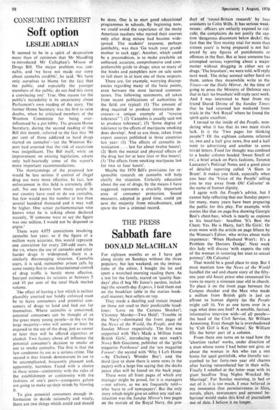THE PRESS
Sabbath fare
DONALD McLACHLAN
For eighteen months or so I have got along nicely on Sundays without the • three populars; but last weekend, on the instruc, tions of the editor, I bought the lot and spent a wretched morning reading them. As a test for the family, reared on 'quality Sun- days' plus (I beg Mr Junor's pardon, includ- ing) the seventh-day Express, I laid them out on the breakfast table in the station book- stall manner, best-sellers on top.
They made a dazzling and instant impact on those not used to their predictable head- lines: 'Love on The Campus Shocker'; `Chimney Murder—Two Held'; 'Trouble in the Navy'—dominated the front pages of the News of the World, the People, and the Sunday Mirror respectively. The first was supported with 'He's Made a Million from British Girls', introducing (in next week's Now) Bob Guccione, publisher of the 'girlie magazine Penthouse' and the 'sex magazine Forum': the second with 'Why I Left Home —by Chelsea's Wonder Boy'; and the third (just to show there is some news in the paper) with a large line saying that the docks peace plan will be found on the back page.
These were all front pages of which any manager might be proud, for it is managers —not editors, as we are frequently told— who 'have to sell newspapers'. But the only story which might give an editor any real sat- isfaction was the Sunday Mirror's two pages on the morale of the Royal Navy, the pro- duct of 'round-Britain research' by four assistants to Colin Wills. It has serious weak- nesses: officers are unfairly exposed to ridi- cule; the complaints do not justify the cap- tion 'dangerous discontent below decks'; the fact that the 'first mutiny trial for more than sixteen years' is being prepared is not bal- anced by any figures of punishments or offences in the fleet. But at least someone has attempted serious reporting about a major matter without dragging in either sex or drugs. 'The brasshats', we were told, will reply next week. The delay seemed rather hard on them, unless they meanwhile write to the Times—or the Daily Mirror. At the time of going to press the Ministry of Defence says that in fact `no brasshats' will reply next week. And I was interested to hear from my friend David Divine of the Sunday Times that he had returned last weekend from trials in the 'Ark Royal' where he found the spirit quite excellent.
I turned to the inside of the People, won- dering what it has that its two main rivals lack. is it the 'Two pages for thinking people'? Of the eighteen columns referred to, two and a half give news, five and a half went to advertising and another to some trivial letters. Food for thought was confined to a leader column headed 'Sweet Smell of cs', a brief attack on Paris fashions, Terence Lancaster's Political Notes and a good piece of detailed reporting called 'A Slum in Brum'. It makes you think, especially when you hear the 'Voice of the People' telling you to stay away from Oh! Calcutta! in the name of human dignity.
I agree with the People's advice, but I cannot help reflecting that our Sunday papers for many, many years have been preparing the public for this play. For example, with stories like that on page five showing Georgie Best's chest-hair, which is nearly as copious as his head-hair: headline 'It's Best the Chest; Yes, He is Hairy, Isn't He Girls'. Or even more with the article on page fifteen by the Woman's Editor, who writes about male impotence: 'When Husband Won't: It's a Problem the Doctors Dodge'. Next week this lady will discuss 'with experts the role of the woman in restoring her man to sexual potency'. Oh Calcutta!
That would be a good place to stop. But I must mention how the News of the World handled the sad and chaste story of the fifty- one year old Jesuit priest who renounced his vows to marry a nineteen year old in church. To place it on the front page between the Campus shocker and the Man who made a million from British girls is just an affront to human dignity (as the People might call it). Yet as one turns over in a rage what does one find? A sensible, factual, informative interview with—of all people— the head of the Civil Service, Sir William Armstrong. Even though he is overshadowed by 'Cult Girl is Key Witness', Sir William fills the better part of a column.
From there one turns on to read how the 'abortion racket' works, under direction of a man whose name I had better not give; or about the woman in Aix who ran a rest home for aged gentlefolk, who literally suc- cumbed to her forty-two year old charms after having remembered her in their wills. Finally I rebelled at the letter page with its giant headline 'Stag Nights Wrecked My Marriage'. For Sunday morning, in bed or out of it, it is too much. I once believed in my innocence that permissiveness in films, novels, plays, newspapers and personal be- haviour would make this kind of journalism out of date. I believe it no longer.






























 Previous page
Previous page